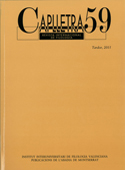Usage of loanword and learned and derivative compounding neology on TV programmes
DOI:
https://doi.org/10.7203/caplletra.59.6908Keywords:
lexical borrowing, global English loanwords, language usage on TV, adaptation of new words on radio and TV, specialized terminology of classical origin, acronymy, blending Abstract
Abstract
Abstract: This contribution to neology in Catalan as used in the oral mass media, especially on television, allows us to confirm that loanword neologisms, i.e. words that name new objects and concepts, come mostly from English. In fact, English has become the global source of language innovation in a great variety of fields, especially in sports and technology. In addition to that, specialized terminology, made up of classical roots and learned affixation, contribute to renew and enlarge the expressive ability and communicative resources of languages in any scientific field as a result of the rapid evolution of our society. It includes various processes, such as learned derivation and compounding, word formation from proper names, blends and acronyms, as well as adaptation of new words to Catalan spelling and pronunciation rules.Key words: lexical borrowing, global English loanwords, language usage on TV, adaptation of new words on radio and TV, specialized terminology of classical origin, acronymy, blending.
 Downloads
Downloads
Downloads
Published
How to Cite
-
Abstract771
-
PDF (Català)540
Issue
Section
License
Authors submitting work to Caplletra for publication must be the legitimate holder of the usage rights. Legitimacy for the purposes of publishing the work must also include images, tables, diagrams and any other materials that may complement the text, whether they are the author of such material or not.
Copyright: on publishing their work in the journal, the author grants Caplletra. Revista Internacional de Filologia usage rights (reproduction, distribution and public communication) for both the paper printed version and for the electronic version.
All work published in Caplletra is covered by the Creative Commons license type Attribution-NonCommercial-NoDerivatives 4.0 (CC BY-NC-ND 4.0).
RESPONSABILITY
Caplletra. Revista Internacional de Filologia does not necessarily identify with the points of view expressed in the papers it publishes.
Caplletra. Revista Internacional de Filologia accepts no responsibility whatsoever for any eventual infringement of intellectual property rights on the part of authors.






